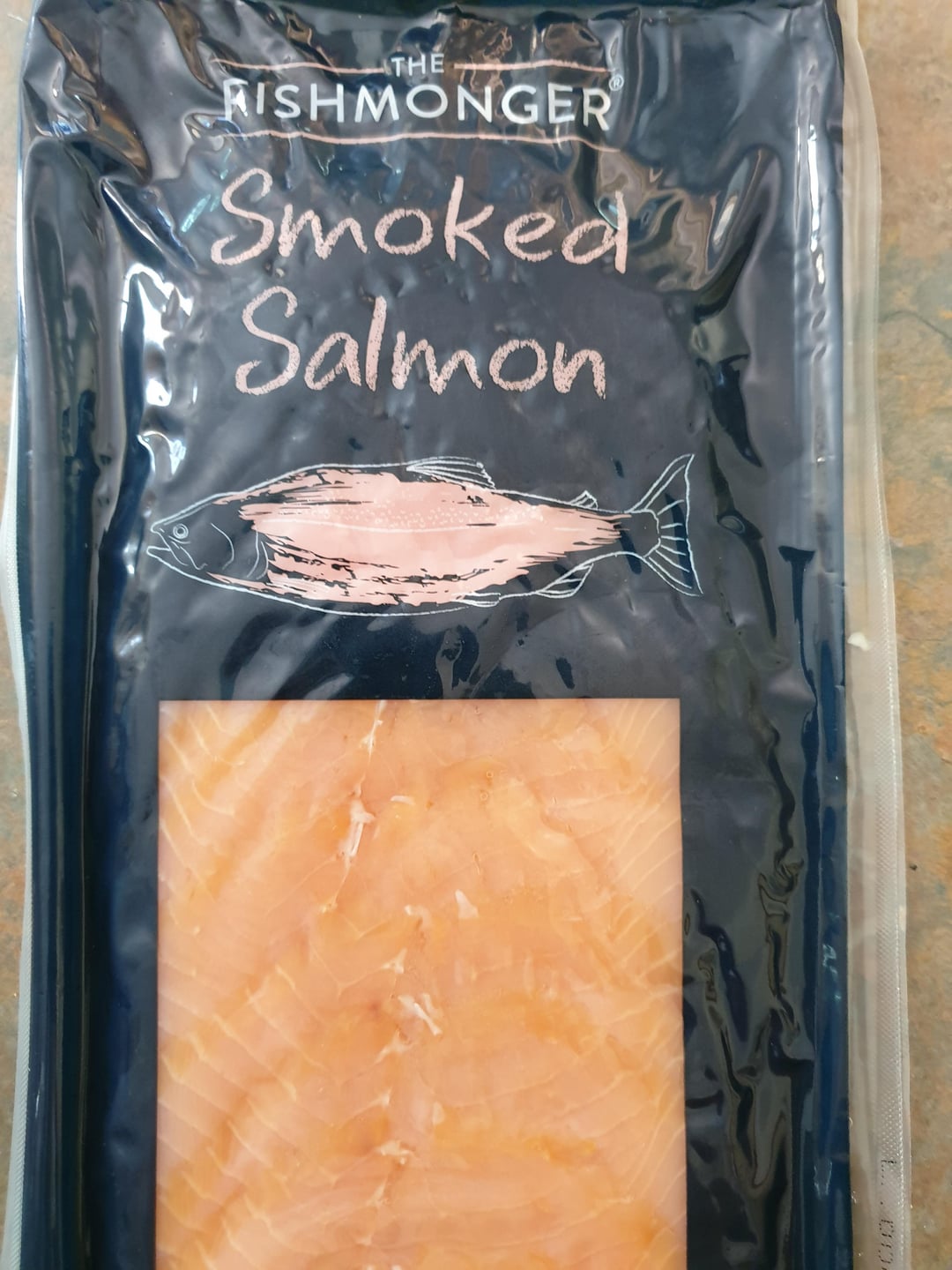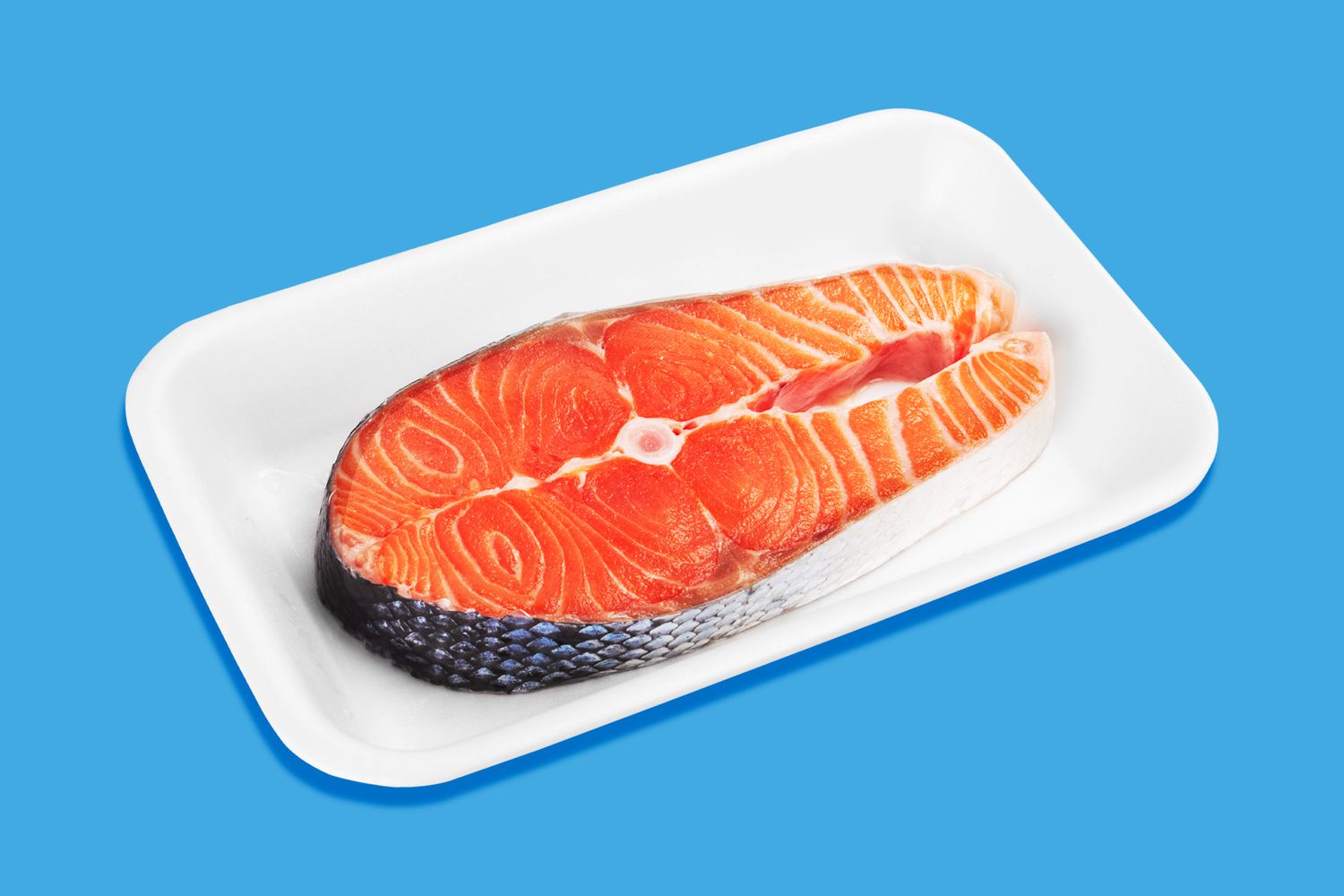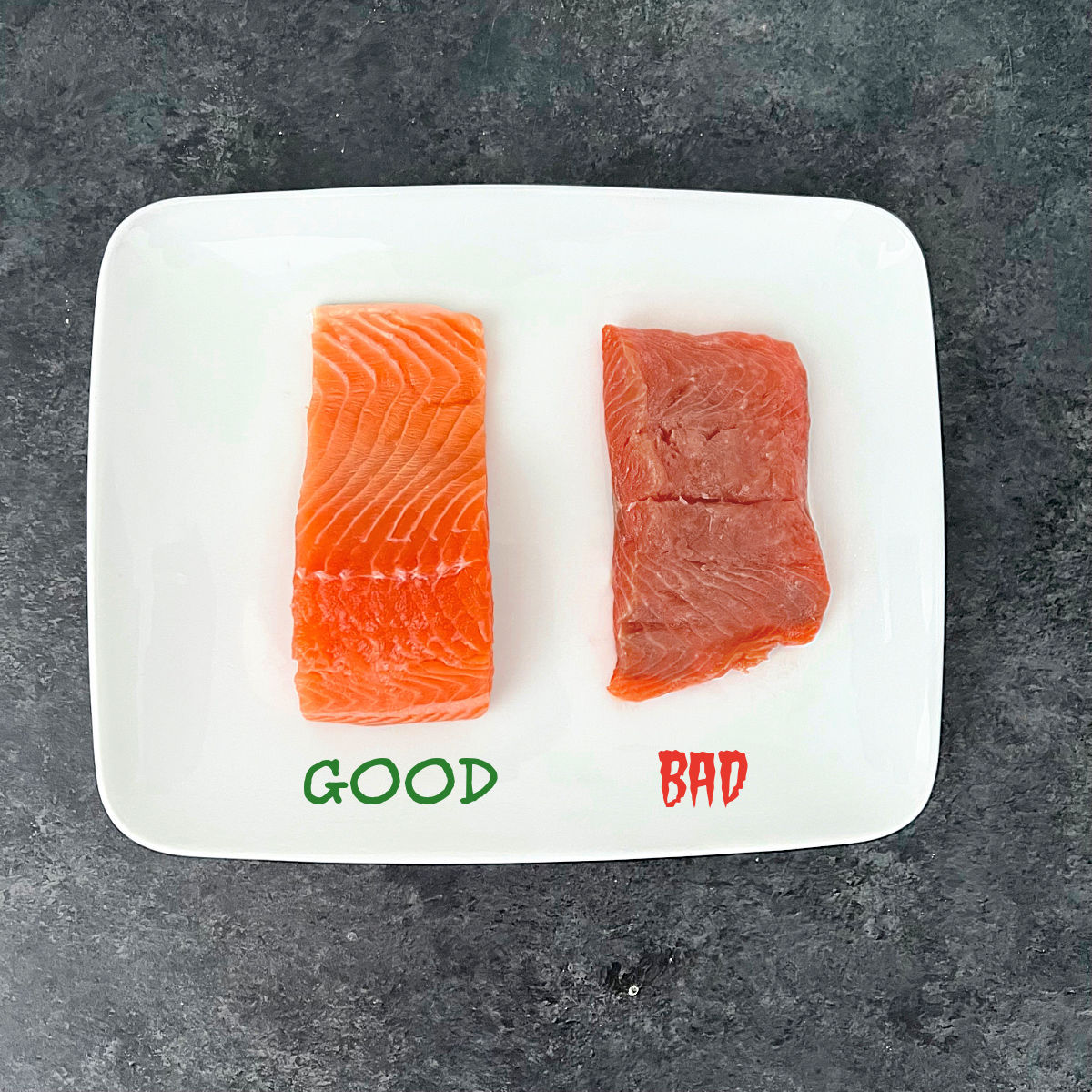Salmon is a delicious and versatile fish, perfect for grilling, baking, or pan-frying. But like any perishable food, it’s important to store salmon properly to ensure it stays fresh and safe to eat.
This guide will delve into the question of How Long does Salmon lasts, exploring factors that influence its shelf life and providing tips for keeping it fresh in your refrigerator or freezer.
Keeping Salmon Fresh: A Guide

Salmon’s freshness is key to enjoying its delicious flavor. Here’s how to store it properly and prevent spoilage:
- Act Quickly: Fresh salmon is perishable. To maintain its quality, plan to cook or freeze it within two days of purchase.
- Shield it from Air: Wrap it tightly in plastic wrap or place it in a resealable bag. This protects the salmon from air exposure, which can accelerate spoilage.
- Freshness First: When buying salmon, choose vibrant-colored fish with firm flesh. These signs indicate optimal freshness.
The Importance of Proper Storage
Storing salmon correctly is vital to ensure its safety and deliciousness. Here’s why:
- Time is of the Essence: Unrefrigerated salmon spoils quickly – lasting only about two hours before deterioration sets in.
- Minimize Exposure: Wrap the salmon tightly or use a resealable bag to minimize air contact and prevent contamination from other foods in your fridge.
- Freshness Matters: Just like when buying, look for signs of freshness at the store. The vibrant color and firm texture indicate a high-quality fish.
By following these simple tips, you can extend the shelf life of your salmon and savor its taste at its peak.
Keeping Salmon Fresh: Temperature and Packaging

Like most seafood, salmon has a limited shelf life. Several factors can impact how long it stays fresh and delicious. Let’s explore two key elements: temperature and packaging.
Temperature: The Key to Freshness
Temperature is crucial for maintaining salmon quality. Ideally, salmon should be stored between 32°F and 38°F (0°C and three °C). This cold environment slows down bacterial growth, which can cause spoilage. If stored above 40°F (4°C), salmon will spoil more quickly. Remember, proper refrigeration or freezing is essential to maximize shelf life and ensure safe consumption.
Packaging Matters
The right packaging goes a long way in keeping your salmon fresh. Vacuum-sealed bags or airtight containers create a barrier against air and moisture, the main culprit behind spoilage. These methods also prevent unwanted odor absorption from other foods in your fridge or freezer. Proper packaging helps retain salmon’s natural oils and juices, preserving its flavor and texture for a longer period. Choose high-quality packaging and ensure a secure seal to maximize freshness.
Refrigerating Salmon For Longevity

Salmon is a delicious and nutritious fish, but it’s important to store it properly to maintain its freshness and quality. Here’s a guide to refrigerating salmon for the best results:
- Prevent Spoilage: Wrap your salmon tightly in plastic wrap or place it in a resealable plastic bag. This keeps air and potential contaminants away.
- Temperature Matters: Store the salmon on a low shelf in your fridge. This is typically the coldest part, ideally between 32°F and 38°F.
- Plan Your Meals: Fresh salmon will stay good for up to 2 days in the refrigerator. For the best quality, be sure to use it within this timeframe.
Bonus Tips for Peak Freshness:
- Original Packaging: If possible, keep the salmon in its original packaging.
- Double Wrap: If not, wrap it tightly in plastic wrap for extra protection.
- Catch the Drips: Place the wrapped salmon on a shallow dish or plate to catch any leaks.
- Mind Your Neighbors: Avoid storing strong-smelling foods near the salmon to prevent flavor transfer.
- Trust Your Senses: Regularly check the salmon for spoilage signs, such as an off odor or slimy texture. Discard it immediately if anything seems off.
Freezing Salmon For Extended Storage

Freezing is a fantastic way to extend the shelf life of salmon. Properly frozen salmon can stay fresh and delicious for up to three months. Here’s how to do it right:
- Start Fresh: Choose high-quality, fresh salmon fillets or steaks.
- Clean and Dry: Rinse the salmon thoroughly under cold water and pat it completely dry with paper towels. Excess moisture can lead to freezer burn.
- Wrap Tightly: Individually wrap each salmon piece in plastic wrap to create a barrier against air exposure.
- Double the Protection: To prevent freezer burn, wrap the plastic-wrapped salmon in aluminum foil.
- Label and Date: Label each package with the date to keep track of how long it’s been frozen.
Following these simple steps will ensure your frozen salmon stays fresh and flavorful for months.
Thawing Techniques:
When it’s time to cook your salmon, thaw it properly to preserve its quality. Here are two recommended methods:
- Slow and Steady (Refrigerator Thawing): Place the sealed salmon package in the refrigerator for a slow and gentle thaw. Allow 24 hours for complete thawing. This method is ideal for maintaining the texture and flavor of the fish.
- Faster Thawing (Cold Water Method): If you’re short on time, place the sealed salmon in a leak-proof plastic bag and submerge it completely in cold water. Change the water every 30 minutes until thawed.
Important Reminders:
- Avoid thawing with hot water or leaving salmon at room temperature for extended periods, as this can promote bacterial growth.
- Once thawed, cook and consume your salmon within 1-2 days for the best flavor and quality.
Spotting Spoiled Salmon: A Guide to Freshness

Keeping your salmon safe to eat is crucial. Here’s how to identify signs of spoilage:
- The Nose Knows: Fresh salmon has a mild, clean scent. A strong, fishy odor indicates spoilage.
- Texture Tells: Fresh salmon should be firm and spring back when pressed gently. If it feels slimy or sticky, it’s past its prime.
- Look for Luster: Vibrant pink or orange is the ideal color for salmon. Dullness, graying, or browning suggests spoilage. Mold growth on the surface is another clear giveaway.
If you notice any of these signs, discard the salmon to avoid potential illness.
Risks of Eating Spoiled Salmon
Consuming spoiled salmon can lead to foodborne illness. Bacteria like Salmonella and Listeria thrive on spoiled fish, causing symptoms like nausea, vomiting, diarrhea, and fever. In severe cases, dehydration and medical attention may be necessary.
Furthermore, some bacteria produce toxins that can cause botulism poisoning, a potentially life-threatening condition.
To keep yourself safe, always ensure proper storage and handling of your salmon to maintain freshness and prevent spoilage.
Conclusion And Best Practices
This passage highlights the importance of proper storage techniques to ensure both the taste and safety of your salmon. By following these best practices, you can extend the shelf life of your fish and enjoy delicious salmon dishes for longer.
The key takeaways are storing salmon at the correct temperature and using appropriate packaging. Refrigerate fresh salmon for up to two days, wrapped tightly to prevent air exposure. If freezing for longer storage, double-wrap the salmon in plastic wrap and aluminum foil to avoid freezer burn. Remember to thaw frozen salmon safely in the refrigerator or use the defrost function on your microwave. Finally, always inspect your salmon for spoilage before cooking to ensure a safe and enjoyable meal.
References:
FAQ About How Long Does Salmon Last: Keeping Your Salmon Fresh
Q: How long can fresh salmon last in the refrigerator?
A: Fresh salmon can last in the refrigerator for up to two days if stored properly in an airtight container or wrapped tightly in plastic wrap.
Q: What is the best way to store cooked salmon?
A: Cooked salmon should be stored in the refrigerator and can last for up to three days. Make sure to place it in an airtight container or wrap it tightly in plastic wrap.
Q: Can I freeze salmon to make it last longer?
A: Yes, you can freeze salmon to extend its shelf life. Wrap the salmon tightly in plastic wrap or aluminum foil before placing it in a freezer-safe container. Frozen salmon can last up to three months.
Q: How can I tell if salmon has gone bad?
A: If salmon has a strong fishy odor, slimy texture, or discolored patches, it may have gone not good and should be discarded. Fresh salmon should have a mild sea smell and appear firm and pink.
Q: Can I refreeze salmon after it has been thawed?
A: It is not recommended to refreeze salmon once it has been thawed. To avoid waste, only thaw the amount of salmon you plan to consume and cook it thoroughly to ensure safety.
Q: What is the best way to store smoked salmon?
A: Smoked salmon should be tightly wrapped in plastic wrap or stored in an airtight container in the refrigerator. It can last for up to two weeks in the fridge and longer when frozen.
Q: Is it safe to eat salmon past its expiration date?
A: It is not advisable to consume salmon past its expiration date. Always check for signs of spoilage before consuming any seafood to prevent foodborne illnesses.

Welcome to Braddock Bay Tavern & Grill, where history, delicious cuisine, and stunning views come together to create an unforgettable experience. Our restaurant, situated on the picturesque edge of Lake Ontario, has a rich history that adds a unique charm to your dining experience. The roots of our establishment can be traced back to 1865, when it was first constructed as an icehouse. Over the years, it transformed into the historic Braddock Bay Hotel, becoming a beloved local landmark. Today, we take pride in preserving the building’s historical beauty, ensuring that every visit to our restaurant is a journey through time.